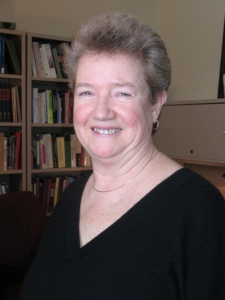News
From the newsletter: Decoding digital humanities, part I
Sociology as Much as Technology: Martha Nell Smith WS ’84 on Digital Scholarship
“Everybody gets so much information all day long that they lose their common sense,” Gertrude Stein wrote in 1946, when Alan Turing was developing his machine. If today’s burgeoning online resources in the humanities create a sometimes bewildering deluge of information, they also, as Martha Nell Smith WS ’84 notes, change how scholars analyze, craft, debate, and share information.
 Dr. Smith has headed two of the nation’s best-known digital humanities sites. In 1994, as a Fellow of the Institute for Advanced Technology in the Humanities (IATH) at the University of Virginia, she founded the Dickinson Electronic Archives (www.emilydickinson.org). The DEA hosts manuscripts of and commentaries on the poet’s work, as well as related correspondence and works. Through the DEA Dr. Smith, in 2012, revealed and analyzed a daguerreotype that may be the only known image of Dickinson as an adult.
Dr. Smith has headed two of the nation’s best-known digital humanities sites. In 1994, as a Fellow of the Institute for Advanced Technology in the Humanities (IATH) at the University of Virginia, she founded the Dickinson Electronic Archives (www.emilydickinson.org). The DEA hosts manuscripts of and commentaries on the poet’s work, as well as related correspondence and works. Through the DEA Dr. Smith, in 2012, revealed and analyzed a daguerreotype that may be the only known image of Dickinson as an adult.
Her DEA experience also paved the way for Dr. Smith’s 1998 creation of the Maryland Institute for Technology in the Humanities (MITH) at the University of Maryland. “We were the first wave,” she recalls. “In the United States, there was IATH; a group at Brown that produced the Women Writers Project; Matrix at Michigan State; and ourselves.”
“Some of my colleagues thought I was crazy,” she says, “worried that getting enamored of computing would take away from the humanities research. I would say it’s using computational tools to advance research.” While Dr. Smith stepped aside as director in 2005, MITH remains a leading digital humanities center.
Digital tools, she observes, have changed scholarship, but ultimately human interaction guides their use. In a landmark 2007 essay, “The Human Touch: Software of the Highest Order,” Dr. Smith argues for embracing a collaborative, interdisciplinary, interpretive sensibility in digital scholarship that does not conform to traditional methods. For example, old notions about the validity of particular scholarly editions, or about the invisible authority of any one editor’s changes, are replaced by an awareness of the ways in which different editors and editions engage each other.
“One of the most important technologies I have learned about is collaborative work. It trains people for various workplaces,” she says. “The reach of digital scholarship is also huge. You can reach many people that you wouldn’t engage through traditional book and article publication.”
What about peer review, the academy’s traditional quality control for published research? “I do think peer review is important,” Dr. Smith avers. “Putting publications online [without peer review] can yield pieces that are not so good. But on the other hand you might get feedback and critical review that you wouldn’t get through regular channels. You might get an expert perspective from a quarter you don’t expect.”
Digital scholarship can bring a similar breadth of perspective to original sources, Dr. Smith says. “With primary materials—items previously viewable only by experts allowed into Special Collections and the like—now being examined by non-experts, sometimes very productive questions are posed, questions that those in the know have been schooled out of.”
At the same time, the increasingly digital nature of primary materials themselves poses dilemmas, she observes, as future scholars will no longer rely on marginalia and marked-up text. “Now I’m really arguing for making sure that that various publication states be preserved and not just overwritten. It’s important to have digital preservation markers that show different stages of work, so that people can see and learn from various evolutions.”
Dr. Smith’s leadership in digital humanities is shaped by her commitment to feminist scholarship. Her 2014 article, “Frozen Social Relations and Time for a Thaw: Visibility, Exclusions, and Considerations for Postcolonial Digital Archives,” contends that, while online access makes it possible to share ideas and information without respect to class, race, gender, or sexuality, funding and recognition still conform to traditional social structures that privilege certain groups over others.
Digital scholarship, in the end, changes the way tomorrow’s scholars will approach materials and exchange ideas. Dr. Smith says she cautions her students about the irrevocability of online publications, the volatile culture of response to online work, and the ease with which anyone working digitally may be deprived of full credit. The true innovation in digital scholarship, she suggests, may be less technological than sociological. “The positive side for scholars,” she adds, “is that you may make connections that you wouldn’t make otherwise.”
###
This story appeared in the fall issue of Fellowship, the newsletter of the Woodrow Wilson Foundation, in a section titled Decoding Digital Humanities: Perspectives on an emerging and ever-changing field. To see the full newsletter, click here.


